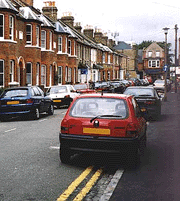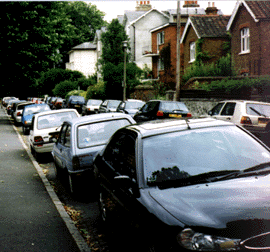
Quarts into Pint Pots? |

Quarts into Pint Pots? |
 In recent years, residents of Albany Road, and surrounding streets, have had difficulty finding parking spaces near their homes. Most of the properties are terraced or semi-detached 'villas' built at the end of the last century, and no-one could possibly have envisaged the form of transport that almost all of us would be using 100 years later. With no drives, garages or back access, private cars have to be parked on the street. The problem has relentlessly increased over the years as families have become car owners, and sons and daughters become car owners too. In addition, staff from nearby shops and offices add to the problem as they look for somewhere to leave their cars while they are at work. And then there are the shoppers who are reluctant to use public transport as they find it just does not match their needs. The introduction of double yellow lines and areas of Resident Only parking can do little to alleviate the problem when, quite simply, there are more cars than there are spaces to park them. The current situation has come about as the Police, following warnings, have decided to implement the law, resulting in fines for those residents, and one assumes, shoppers and local office staff, who park on double yellow lines and in Resident Only areas. Andrew Foakes, Albany Road resident, writes:Police Parking Initiative in Central WindsorOn 13th July, the police dropped a letter into all the houses in central Windsor stating that from the 17th July, the police would enforce all parking regulations. The letter was a little ambiguous, but many residents rang the police to find that an even harder line was given: any car illegally parked would be fined. Although this sounds reasonable, there is a history of parking problems in central Windsor which this initiative simply ignored. The council allow 2 parking permits per household, for which the residents pay £5 each. Unfortunately, the number of permits issued for the central Windsor area exceeds the number of parking places available. This is particularly obvious at the weekends and evenings. So a pragmatic solution has been arrived at. During working hours on week days, the local residents obey all parking restrictions. However, during the evening and weekends, some on-pavement illegal parking occurs in many streets in the Central Windsor area. Generally, this is done so as to cause minimum inconvenience to the other residents, and as the majority of the local residents are car owners, this has been accepted as part of the life style in central Windsor. Even the council have recognised this, with requests to the police and traffic wardens to be lenient to local residents. The police initiative cut across this tacit agreement and was without council or local councillor agreement. It was extremely unwelcome by the local residents. In one well publicised response, a local resident, merely scrawled "SUGGEST WHERE WE PARK" in bold black ink on the police letter and faxed it straight back to Inspector Paul Tinnion, who was leading the police effort. The residents of Albany Road led a co-ordinated campaign of ringing the police to stop the strict enforcement. Councillor Michael Scott lent his strong support for the locals' desire for a proper resolution of the parking problem rather than this one-off and unsustainable police initiative that would solve nothing in the long term but create a lot of stress and bad feeling in the short term. Eventually, the police backed down under the enormous amount of feedback they received. In the police's defence, they had received a number of complaints about dangerous and particularly inconsiderate parking to which they had a duty to respond. They had also tried a couple of less draconian local initiatives, such as publicity in the local press and a leaflet left with every car that was illegally parked, which received no response. Nonetheless, this initiative by the police has been a public relations disaster, showing them to be out of touch and unable to view the real problems of traffic management in central Windsor in a practical way. If there is a positive thing to come out of this episode, it is that the council and police now recognise what the locals already knew; that at weekends and in the evenings, it is impossible to enforce parking regulations in central Windsor because there simply are not enough spaces for the number of cars. Yet while the status quo also makes the police unable to enforce parking regulations due to the upset this will cause the car-owning majority, most also agree that the status quo is far from ideal as it does create some victims, such as those who do not have cars but live where cars are regularly parked on the pavement outside their front gates. Everyone agrees that the ideal situation is that all cars are parked legally, enabling proper and publicly supported enforcement of the parking regulations. Obviously, this means creating more parking spaces for local residents, and there a number of options available to do this, such as reviewing the current placement of double yellow lines and allowing some on-pavement parking where space allows and inconvenience is kept to a minimum. The current system of permits could also be reviewed, with proper zoning to allow only those who are truly local to park in a given area. The police and council are now working together to draw up a set of proposals and have promised that a public meeting will be held in the near future. Andrew and Elaine Foakes  To contact us, email Thamesweb. |